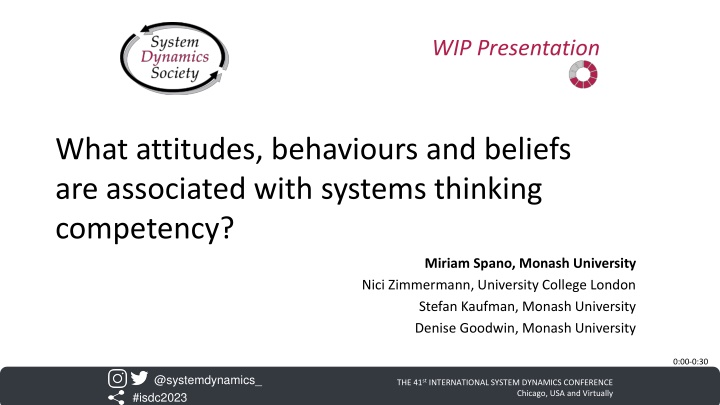
Systems Thinking Competency in Public Sector Organizations
Explore the attitudes, behaviors, and beliefs associated with systems thinking competency in public sector organizations, aiming to enhance organizational capability to navigate complexity and drive effective systems change. This research delves into defining, developing, and embedding systems thinking competency to bolster capacity and responsiveness in the public sector.
Download Presentation

Please find below an Image/Link to download the presentation.
The content on the website is provided AS IS for your information and personal use only. It may not be sold, licensed, or shared on other websites without obtaining consent from the author. If you encounter any issues during the download, it is possible that the publisher has removed the file from their server.
You are allowed to download the files provided on this website for personal or commercial use, subject to the condition that they are used lawfully. All files are the property of their respective owners.
The content on the website is provided AS IS for your information and personal use only. It may not be sold, licensed, or shared on other websites without obtaining consent from the author.
E N D
Presentation Transcript
WIP Presentation What attitudes, behaviours and beliefs are associated with systems thinking competency? Miriam Spano, Monash University Nici Zimmermann, University College London Stefan Kaufman, Monash University Denise Goodwin, Monash University 0:00-0:30 @systemdynamics_ #isdc2023 THE 41st INTERNATIONAL SYSTEM DYNAMICS CONFERENCE Chicago, USA and Virtually
Problem Statement Public Sector organisations* are increasingly looking for systems thinking (ST) competency as part of their ongoing organisational capability to better respond to the ever increasing complexity and design effective systems change Yet, it is unclear what exactly ST competency is as part of a general skill set; what it looks like in practice and how it can be developed and embedded as part of BAU In order to increase ST capacity in Public Sector organisations, we need to understand who needs to hold what level of competency, and how can it be effectively embedded and demonstrated to allow for evaluation and development *While the focus of this is the public sector in Australia we think this can be generalised 0:30-2:00 @systemdynamics_ THE 41st INTERNATIONAL SYSTEM DYNAMICS CONFERENCE THE 40TH INTERNATIONAL SYSTEM DYNAMICS CONFERENCE #isdc2022 #isdc2023 Chicago, USA and Virtually Virtually everywhere!
Approach or Dynamic Hypothesis Foundation: Systems thinking competency: Generalisable or context dependent? Clustered or stand-alone? In which way is it linked to system change? Apply a behavioural science lens: What does look like at what level? Identify attitudes, behaviours & beliefs Identify enabling context, e.g. organisational settings 2:00-3:30 @systemdynamics_ THE 41st INTERNATIONAL SYSTEM DYNAMICS CONFERENCE THE 40TH INTERNATIONAL SYSTEM DYNAMICS CONFERENCE #isdc2022 #isdc2023 Chicago, USA and Virtually Virtually everywhere!
Progress, Insights, and Questions Analysis: Inductive: Description of ST competency Deductive: Ecological approach/ COM-B Literature Review: Systemised narrative review Key academic works, bibliography search Practice Review: Semi-structured interviews/ survey, grey literature review ST experts, educators & students + OD/ HR specialists, VPS staff Questions: Any thoughts on the approach we are taking ? Are you aware of similar approaches/ research ? Any suggestions in terms of definition, literature or people ? Would you be interested to be interviewed ? Get in touch : miriam.spano@monash.edu Legend: BAU: business as usual; OD: organisational development; HR: human resources; VPS: Victorian Public Sector (Australia); COM-B: Capability, Opportunity, Motivation - Behaviour (model) 3:30-5:00 @systemdynamics_ THE 41st INTERNATIONAL SYSTEM DYNAMICS CONFERENCE THE 40TH INTERNATIONAL SYSTEM DYNAMICS CONFERENCE #isdc2022 #isdc2023 Chicago, USA and Virtually Virtually everywhere!
